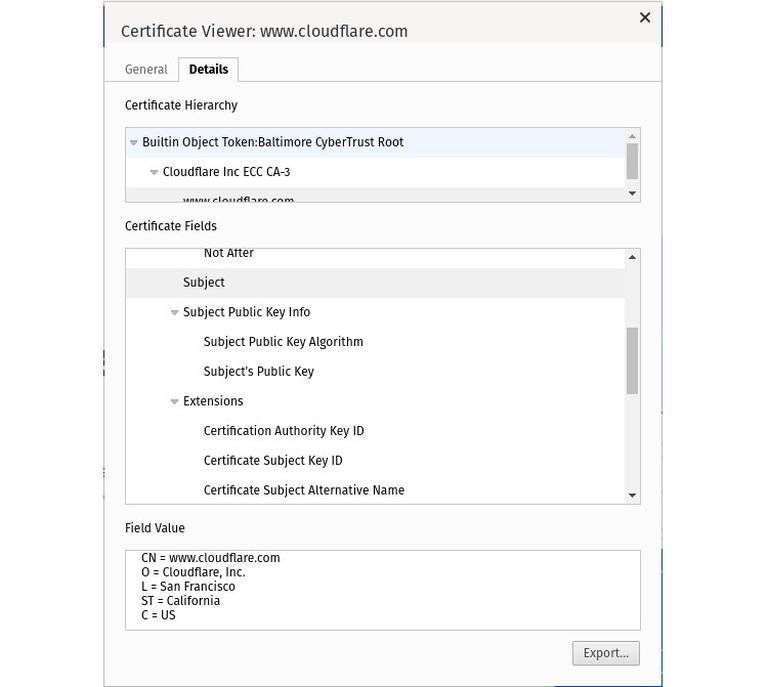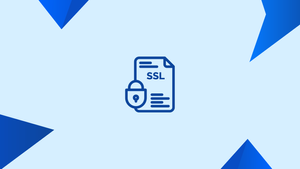Introduction
Before we begin talking about what is an SSL certificate, let's briefly understand – What is an SSL Certificate?
An SSL certificate is a digital certificate that authenticates the identity of a website and enables secure encryption of data transmitted between the website and its visitors. SSL stands for Secure Sockets Layer. It is a cryptographic protocol used to secure communication over the internet.
As a result of all the time people spend online, there is a greater risk of having sensitive information stolen or used fraudulently. Moreover, cyber-attacks have gotten more complicated and demanding along with the increased usage of technology.
Users' attention to protecting their personal information online has increased dramatically in recent years. If you own a website or run a blog, protecting your users' personal information and privacy from hackers should be your top priority.
In this tutorial, we will explain everything about SSL certificate. We will also address a few FAQs on what is SSL Certificate.
What is SSL?
The Secure Sockets Layer (SSL) protocol is a security standard for encrypting data in transit over the Internet and verifying the identity of the web server. SSL encrypts your data so that it may only be seen by the intended receiver when you enter personal or financial details.
If a website has an SSL certificate, then all data sent back and forth between the user's browser and the server will be encrypted. Your data is protected from eavesdropping and man-in-the-middle attacks thanks to an SSL certificate.
When an SSL Certificate is added to a website, the protocol changes from unencrypted HTTP to secure HTTPS. As can be seen in the picture above, your website's URL will also include a padlock, a visual mark of trust. This ensures that all communication between the website and the user is encrypted.
A website with an SSL certificate has a higher chance of being seen in Google's search results and provides a more positive user experience overall. Furthermore, it ensures that the website is legitimate. But how can you verify all of this data?
How can you access the data that an SSL certificate holds?
Any time you see a little locked padlock next to a website's URL in your browser's address bar, you know that you can verify its SSL Certificate by clicking on it. The website's identity is also disclosed there. These are the main points of the SSL Certificate:
- ‘Domain name’ for which the certificate was issued
- The entity, individual, or object to which it was issued
- Name of the Certificate Authority issuing it
- Digital signature of the issuing CA
- The subdomains associated with it
- Date of issuing of the certificate
- Date of expiry of the certificate
This information file is used by the browser in its exchanges with the server to confirm the legitimacy of the website and the SSL Certificate.
How do SSL Certificates Work to Protect User Data and Privacy?
When you have an SSL Certificate installed on your web server, you are given a public and private security key to authenticate the server. These keys are just a long series of made-up numbers. As a bonus, it lets the server encrypt and decode private data sent back and forth between the user and the server.
- When a user visits your website, their browser performs what is called a "Handshake," during which it attempts to authenticate your server and check the authenticity of your SSL certificate.
- When this happens, the web server also sends along with its public key and an encrypted copy of its SSL Certificate.
- The browser verifies the SSL Certificate's validity, expiration date, and trustworthiness by comparing it to a list of known good Certificate Authorities (CAs).
- After verifying the authenticity of your server and SSL Certificate, the browser will send an authentication request to your server.
- To ensure the security of data transmission between the user's browser and the web server, the latter will now send back an acknowledgment that has been digitally signed by the server.
- If the browser detects that your SSL Certificate is invalid, it will show the error message "Your connection is not private," prompting the user to immediately close the browser and go elsewhere.
Several well-known Certificate Authorities (CAs) operate on the web, each selling SSL certificates in a range of prices and features to suit different needs and budgets. To acquire user trust and safeguard your brand's reputation, it is essential to secure your website with a legitimate, inexpensive SSL Certificate. In light of this, let's see if we can figure out the differences between the many SSL Certificates out there.
Types of SSL certificates
Various Validation Levels
There are several validation levels, and the Certificate Authority (CA) provides separate SSL Certificates for each one. Based on these various validation techniques, the SSL Certificates may be categorized as follows:
Domain Validation (DV) SSL Certificate
The CA will issue a DV SSL Certificate when a quick verification procedure has been completed. The CA simply requires one piece of evidence that you are the rightful owner of the domain. Because there is less paperwork necessary in the granting of a DV SSL Certificate, it is often issued in the shortest amount of time. So, it may be issued in the shortest amount of time compared to other SSL certificates. In general, DV SSL certificates are not recommended for sites that handle sensitive information from their users or financial transactions. They are often used to protect blogs because of their low cost.
Organization Validation (OV) SSL Certificate
To ensure the legitimacy of the domain owner, the CA performs domain verification and checks the owner company's credentials before issuing an OV SSL Certificate. A company's identifying details are publicly viewable through its OV SSL Certificate. See the example below for how the "Subject Tab" may be used to reveal information about the firm.

An OV SSL Certificate, which takes longer to issue than a DV SSL Certificate but is preferred by medium-sized businesses, is becoming more common. The verification of the certificate owner's organization takes more time and so costs more than a DV SSL Certificate.
Extended Validation (EV) SSL Certificate
Among SSL certificates, the Extended Validation (EV) Certificate is the gold standard in terms of trust and credibility. To get the EV SSL Certificate, a company must first go through rigorous testing and verification procedures. Address, operating status, legal standing, etc. are just a few of the details that are checked as part of the validation process before issuance. This is why an EV SSL Certificate is the most expensive and time-consuming to produce compared to a DV or OV SSL Certificate.
The address bar will show the company's name, making it easy to confirm its legitimacy. Site seals, which are visual markers of trust, increase users' confidence in the site. Banks, large financial organizations, online marketplaces, etc. all benefit from using EV SSL Certificates.
Different Number Of Domains/Subdomains
Your website's security needs may vary depending on a variety of factors, including the number of domains and subdomains you need to protect.
Single-Domain Certificates
You may protect a single domain or subdomain of your website with a single domain SSL certificate. It works with either the "www" or "not the www" version of the domain.
Instead of purchasing a separate certificate for each every domain and subdomain, it is more efficient (both financially and in terms of time) to get a cost-effective Wildcard SSL Certificate or Multiple-Domain Certificate.
Wildcard Certificates
With a Wildcard SSL Certificate, you may protect your base domain and all of its subdomains at the next level below. The graphic above demonstrates how a single certificate may protect several subdomains like dev.example.com, mail.example.com, etc. by using a wildcard certificate with a common name of the type *.example.com. If you're on a tighter budget but still want robust encryption, a wildcard SSL certificate is your best bet.
Multi-domain/SAN SSL Certificate
Multiple domains or subdomains may be protected by a single SSL certificate when using a SAN (Subject Alternative Name) certificate. Numerous names across multiple domains and subdomains may be protected by easily adding and updating the Subject Alternative Name field. Secure several domains, such as those shown in the picture, using a single SSL certificate by using a Subject Alternative Name (SAN) certificate.
Unified Communications Certificate (UCC)
Multi-Domain SSL certificates were originally developed to protect Microsoft Exchange and Live Communications servers; they are what is now known as Unified Communications Certificates (UCC). Recently, it has been common practice to utilize a single certificate to protect several different domain names. UCC Certificates give the greatest level of trust and security to their users since they are organization-validated and may be used as EV SSL certificates.
FAQs to SSL Certificate
Why do websites need SSL certificates?
Websites need SSL certificates to secure sensitive data, such as personal information, login credentials, and credit card details, from being intercepted and decrypted by unauthorized individuals.
How does an SSL certificate work?
When a user visits a website with an SSL certificate, it establishes an encrypted connection between their browser and the web server. This ensures that data transmitted between the two is secure and private.
How can users identify if a website has an SSL certificate?
Websites with SSL certificates can be identified by the presence of "HTTPS" on the website URL and a padlock symbol in the browser's address bar. These indicators signify that the connection is secure.
Who issues SSL certificates?
SSL certificates are issued by trusted Certificate Authorities (CAs) that verify the authenticity and ownership of the website. Examples of CAs include DigiCert, Let's Encrypt, and Comodo.
What are the different types of SSL certificates?
SSL certificates come in different types such as Domain Validated (DV), Organization Validated (OV), and Extended Validation (EV). Each offers varying levels of validation and security features.
How long is an SSL certificate valid for?
The validity period of an SSL certificate varies, but typically they are issued for 1-2 years. After expiry, the certificate needs to be renewed to ensure continued secure communication.
Are SSL certificates only for e-commerce websites?
SSL certificates are not limited to e-commerce websites. Any website that collects or handles sensitive information should utilize SSL certificates for enhanced security and privacy.
Conclusion
Paying close attention to the security of your user's data is of vital significance if you want to acquire user confidence and drive your online company or blog to new heights of success. The best method to do this is to invest in a low-cost SSL certificate that meets your specific security requirements.
If you have any queries, please leave a comment below and we’ll be happy to respond to them.
